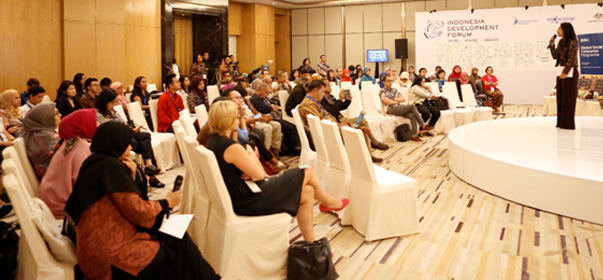Aloysius Wiratmo
One of the highlights of the 2017 Indonesia Development Forum (IDF) was the ‘Ideas and Innovations Marketplace’. In his opening remarks, the Minister of Bappenas/National Development Planning, Prof.Dr.Bambang Brodjonegoro emphasized the Ideas and Innovations Marketplace as “the heart of the IDF”. The Ideas and Innovations Marketplace was designed as an interactive space for development innovators to present and promote their ideas and innovations, as well as broaden their networks and explore possible strategic partnerships and collaboration with donors and development practitioners in addressing inequality issues in Indonesia. There were 44 organisations from national and local levels pitching ideas and innovations on various development issues, including big data, local economic initiatives, education, social enterprises, networks, knowledge management platforms, access to justice, inclusivity, and many others. Among the presenters were several KSI policy research institutes, including Article 33, CWI and CSIS–now members of the budding Aliansi Riset Kebijakan Indonesia (Indonesian Alliance for Policy Research). There were also social entrepreneurs, development partners, including DFAT-supported programmes, and universities.
The two presenters whoreceived most votes from those in attendance, and certificatesfrom the Bappenas’ Minister, were Yohanes Rahail from Jayapura, who spokeon local wisdom-based integrated village schools, and Siti Maryam Rodja, the founder of Baraka Nusantara. Baraka Nusantara is a movement aiming to create a sustainable business model by empowering local businesses. This movement was established in 2015 to address local problems relating to unjust coffee trading systems in Sembalun village, Lombok. “The existing system was considered to perpetuate poverty among local farmers because the traders bought coffee from the local farmers at a very cheap price,” said Siti Maryam Rodja. Baraka Nusantara has addressed this problem by channelling Sembalun’s specialty coffee into the Indonesian coffee industry. Based on this support, local farmers have significantly increased their incomes and enhanced the education of local children. Siti Maryam expressed her gratitude for the opportunity to participate in the 2017 IDF Ideas and Innovations Marketplace. “What I benefitted most from this forum is networking. I have the opportunity to meet various partners from the private sector, NGOs and the government partners themselves. This networking will open the door for us to grow,” she said.
Yohanes Rahail pitched his innovative idea on a local wisdom-based integrated village school in Papua. He has developed this idea since 2007 in Sarmi District, Papua, by using the cultural context (local facilities, symbols, terms, games and artefacts) as mediums for teaching and learning activities. The aim is to build the village children’s confidence to love learning and solve the problem of children not finishing all the years of school in Papua. “Now, all parties in the villages support the idea of a local wisdom-based integrated village school. The village government has allocated budget through village budget allocation (ADD) to cover the village school’s operational cost. There is new hope for the bright future of the young generation in Papua,” Yohanes said.






